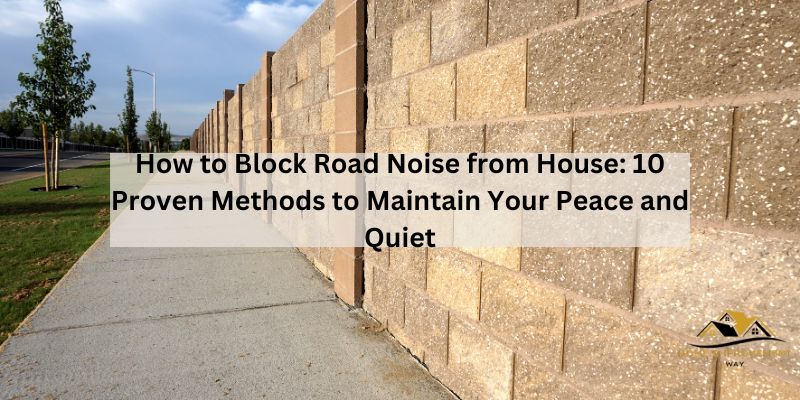To block road noise from your house, use soundproof curtains or install soundproof windows. Are you tired of the constant noise from the road disturbing the peaceful ambiance of your house?
Luckily, there are effective ways to block road noise and enjoy a quieter living space. By using soundproof curtains or installing soundproof windows, you can significantly reduce the amount of noise entering your home. These solutions are not only practical but also cost-effective, providing you with a more serene environment without breaking the bank.
We will explore various methods to block road noise and help you create a tranquil haven within the walls of your house. Say goodbye to the annoyance of road noise and hello to a peaceful sanctuary.
Factors Affecting Road Noise
Road noise can be a nuisance for homeowners, but there are several factors that can affect its presence. By understanding these factors, such as traffic volume, road surface type, and distance from the road, homeowners can take effective measures to block road noise from their house.
When it comes to blocking road noise from your house, it’s important to understand the factors that contribute to the amount of noise you experience. By addressing these factors, you can effectively minimize the impact of road noise and create a serene living environment. The three key factors that affect road noise are: distance from the road, road type, and traffic volume.

Distance From The Road
The distance from the road is a crucial factor when it comes to road noise. The farther your house is from the road, the less noise you will have to deal with. As sound waves travel, they dissipate, so the more distance between your house and the road, the quieter it will be. Ideally, the ideal distance can be determined by conducting a noise survey to pinpoint areas where the sound levels are significantly reduced.
Road Type
The type of road near your house has a considerable impact on the noise levels you experience. Highways and major roads tend to generate more noise due to the higher speed limits and heavier traffic flow. On the other hand, residential streets with lower speed limits and less traffic produce less noise. Knowing the type of road near your house can help you anticipate the level of noise pollution and take appropriate measures to block it.
Traffic Volume
The volume of traffic passing by your house is another important factor when it comes to road noise. Naturally, areas with high traffic density experience greater noise levels. Consider the peak hours and assess if there are any patterns for heavy traffic flow. This will allow you to evaluate whether there are specific times during the day when the noise is more prominent and take appropriate steps to mitigate the noise during those periods.
A combination of strategies can help you minimize road noise and create a peaceful environment in your house. By understanding the distance from the road, the type of road, and considering the traffic volume, you can effectively determine the level of noise reduction measures required.
Effective Methods To Block Road Noise
Road noise can be a significant source of disturbance for homeowners living near busy streets or highways. Fortunately, there are several effective methods to block road noise and create a quieter living environment. By implementing these strategies, you can enjoy a more peaceful and serene home. In this post, we will explore five methods that have proven to be highly effective in reducing road noise.
1. Installing Soundproof Windows
One of the most effective ways to block road noise from entering your home is by installing soundproof windows. These specially designed windows are constructed with multiple layers of glass and a layer of gas in between to act as a sound barrier. Soundproof windows not only block road noise but also offer thermal insulation, improving energy efficiency and reducing utility bills.
2. Adding Thick Curtains Or Drapes
Another simple yet effective method to minimize road noise is by adding thick curtains or drapes to your windows. The heavy fabric of these window coverings acts as a sound absorber, reducing the amount of noise that enters your home. Pairing soundproof curtains or blackout blinds with soundproof windows can further enhance the noise reduction capabilities.
3. Using Weatherstripping And Sealants
Sealing any gaps or cracks around your windows and doors is crucial to prevent sound from infiltrating your home. Weatherstripping materials can be applied to seal gaps in windows and doors, preventing both air and noise leakage. Additionally, using sealants to seal any gaps in exterior walls and foundations can further enhance the effectiveness of soundproofing.
4. Insulating Walls And Floors
Adequate insulation in the walls and floors of your home can significantly reduce the transmission of road noise. Consider adding insulation materials such as soundproof foam panels, fiberglass insulation, or acoustic tiles to the walls and floors facing the road. These materials absorb and dampen sound vibrations, minimizing the impact of road noise in your living space.
5. Creating Outdoor Barriers
Building outdoor barriers between your home and the road can be an effective method to block road noise at its source. Constructing a solid or dense fence or planting dense hedges or shrubs can help obstruct sound waves from reaching your property. Combining different barrier materials, such as concrete panels and vegetation, can further enhance the noise-blocking effect.
By implementing these effective methods, you can significantly reduce road noise and enjoy a quieter living environment. Whether you choose to install soundproof windows, add curtains and drapes, use weatherstripping and sealants, insulate walls and floors, or create outdoor barriers, taking action to block road noise will undoubtedly make a positive impact on your quality of life at home.

Other Preventative Measures
Block road noise from your house using other preventative measures. These methods provide effective ways to minimize and block out unwanted noise, ensuring a peaceful and quiet environment inside your home.
1. Planting Tall Shrubs And Trees
If you’re looking to block road noise from your house, one effective solution is to plant tall shrubs and trees along the roadside. These natural barriers have the ability to absorb sound waves and reduce the noise reaching your living space. Plus, they add beauty and privacy to your property.
When selecting shrubs and trees, opt for dense foliage varieties such as arborvitae, Leyland cypress, or holly bushes. These plants create a thick wall that can better deflect and absorb the noise. Additionally, consider choosing evergreen varieties that maintain their foliage throughout the year, providing year-round noise reduction.
2. Installing Fences And Walls
Another effective way to block road noise is by installing fences and walls around your property. These structures act as physical barriers and help to reflect the sound waves back towards the road. Solid fences or walls made of materials like wood or concrete are the best options for noise reduction.
Ensure that the fence or wall is tall enough to provide adequate noise cancellation. Ideally, it should be at least 8 to 10 feet high. Additionally, consider adding acoustic panels or insulation to the structure to further enhance its noise-blocking capabilities. By combining these methods, you can create an effective sound barrier around your home.
3. Using Water Features
Water features not only add a calming and aesthetic element to your outdoor space but can also help to mask road noise effectively. The sound of running water, whether it’s from a pond, fountain, or waterfall, can help to divert your attention from the surrounding noise pollution.
Strategically place water features near the areas where road noise is most prevalent, such as the patio or windows facing the road. Ensure that the size and flow of the water feature are appropriate for your space. The gentle sound of flowing water will not only create a serene ambiance but also help to drown out unwanted noise.
4. Modifying Road Surface
In some cases, modifying the road surface can help minimize the impact of road noise. One option is to use quiet pavement technology, which involves using specialized materials that reduce tire noise. These materials absorb and dissipate the sound, reducing the overall noise levels near your house.
Additionally, road resurfacing and better maintenance can also contribute to noise reduction. Smooth surfaces without potholes or cracks create less noise compared to rough or worn-out roads. Consider contacting your local municipality or transportation authority to discuss the possibility of road modifications in your area.
5. Soundproofing Doors
Another way to minimize road noise infiltration into your house is by soundproofing your doors. Sound can easily enter through gaps and spaces around doors, allowing noise to seep into your living space. Fortunately, there are several simple methods you can employ to soundproof your doors effectively.
Start by weatherstripping the edges of the door to seal any gaps. Apply adhesive weatherstripping tape or door sweeps to create a tight seal. Another option is to use a door soundproofing kit, which typically includes door seals, insulation, and soundproofing materials to significantly reduce noise transmission.
For enhanced results, consider replacing the door with a solid-core door, which provides better insulation against sound. Combine these measures with the other preventive measures discussed above, and you’ll create a more peaceful and quiet environment within your home.
Conclusion
To effectively block road noise from your house, it is crucial to implement proven techniques. By sealing gaps in windows and doors, adding curtains or blinds, installing soundproofing materials, and planting dense vegetation, you can significantly reduce the impact of road noise on your indoor environment.
Remember, mitigating road noise not only enhances the quality of your living space but also promotes a peaceful and serene atmosphere. Take action today and enjoy the tranquility you deserve.


